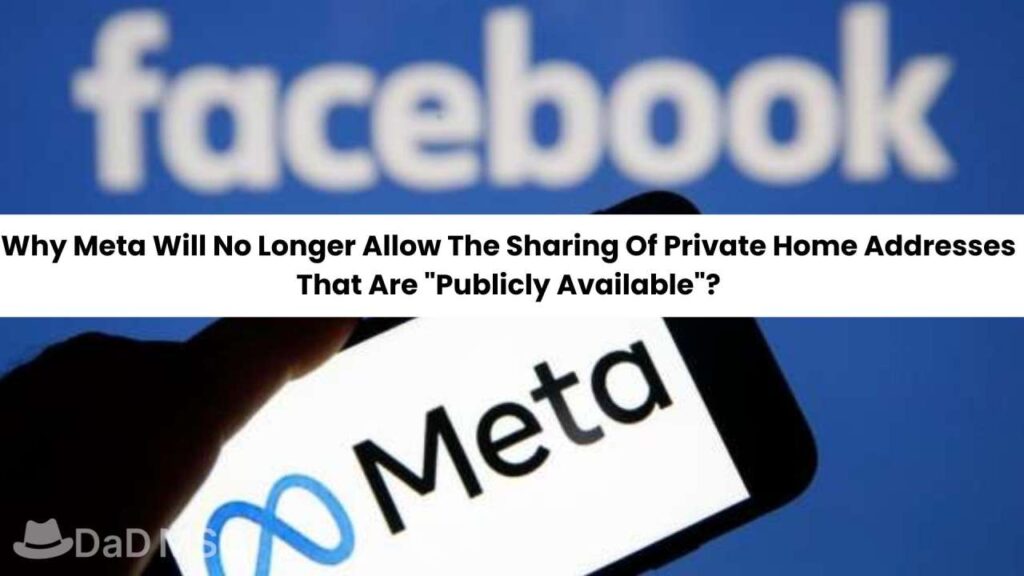Meta, previously Facebook, is changing its policies and will no longer allow users to provide private residence information. Meta, previously Facebook, is changing its policies and will no longer let users submit private residence information if it is already public.
The Facebook parent business said in a statement that it is implementing the Oversight Board’s suggestion to remove an exception that permitted users to post a person’s address as long as it is “publicly available.”
Formerly Facebook, Meta requested that the Supervisory Board look at how private housing information should be handled a year ago. Due to concerns about doxxing, the board issued a response urging Meta to tighten its policy on revealing private addresses.
While Facebook and Instagram already have policies forbidding users from publishing someone’s home address. Meta’s platforms do not penalise users for posting “publicly available addresses”. A published address is any address that has appeared in five or more news outlets in the Meta database. This exemption is currently expected to be revoked within the next several months.
Meta’s response to posts featuring images of the exteriors of private residences also alters. Users may also post the exteriors of public houses belonging to senior officials. We can say that it is like heads of state or ambassadors, and organise demonstrations in these areas. While Meta says it will continue to display users’ addresses. It will not follow the Board’s advice to enable other users to share them again.
What exactly is Doxing?
Doxing (sometimes spelt Doxxing) is the act of releasing identifying information, such as their true name, phone number, and other personal details. As a result, the whole public has access to this material without the victim’s consent.
While the practice of disclosing personal information without authorization predates the internet. The term doxing initially appeared in the 1990s in the realm of online hackers. Occasionally, rival hackers would get into fights and “drop documents” on someone they only knew by a username or alias. “Docs” evolved into “dox” and finally became a verb in its own right (i.e., without the prefix “drop”).
The term “doxing” has evolved outside the hacking community and now refers to the disclosure of personal information. Unmasking anonymous users on social media is still part of the meaning of the word, but it has become less important.
Doxing has recently become a tactic in the cultural wars, with competing hackers doxing persons who hold opposing viewpoints on the other side. Doxers want to take their battles with targets from the internet to the real world by releasing information regarding the policy.
Doxing assaults can range from the seemingly innocuous, such as phoney email sign-ups or pizza delivery, to the considerably more hazardous. It is like pestering a person’s family, other types of cyberbullying, or even in-person harassment.
The doxed include celebrities, politicians, and journalists, who have faced internet mobs, concerns for their safety, and even death threats. When Proctor & Gamble’s Gillette debuted it’s We Believe campaign, which purported to address toxic masculinity, Chief Brand Officer Marc Pritchard’s LinkedIn profile was uploaded on 4chan, with the poster encouraging others to write him furious notes.
When the hacktivist organisation Anonymous released specific information on 7,000 law enforcement officers in retaliation to probe into hacking operations. Since then, Anonymous has doxed hundreds of purported KKK members, with Q-Anon followers among its most recent targets.
Doxing has a variety of reasons. Whenever users believe that their target has injured or humiliated them, they may seek revenge. If someone gets well-known for their divisive views, they may seek out those who have opposite views. Regardless, this is more typically the case when the topic is highly politicised, notwithstanding regular political tensions.
The goal of intentionally disclosing personal information online is generally to penalise, frighten, or humiliate the victim. However, doxers may consider their acts as a chance to redress perceived wrongs. It brings someone to justice in front of a public audience or uncovers a previously hidden motive. The primary goal of doxing is to infringe on people’s privacy, which can place them in an awkward situation.
Conclusion
Meta’s proposed policy changes, most notably its decision to eliminate the home address exception. It should provide an additional degree of safety for doxxing victims. Doxxing is the online publication of a person’s name or home address to launch an intimidation campaign against them. Meta is also responding to the Supervisory Board’s policy suggestions for the first time.
A group of experts from a variety of disciplines formed the Oversight Board in 2020. They give outside advice on Meta’s moderating choices and rules across all of its platforms. As the board’s decisions did not bound it, Meta must respond to any suggestion made by the Oversight Board, as it did in this case.


